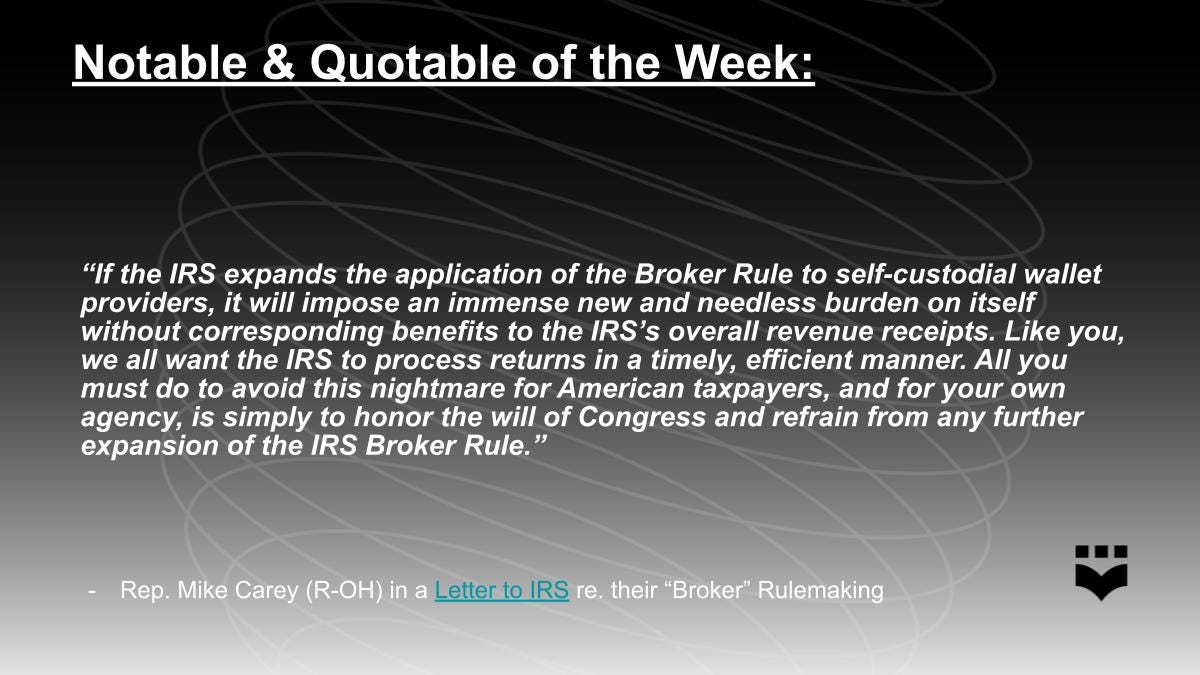Personnel Updates in Washington; Update in SEC NFT Challenge
Personnel Updates in Washington
What happened?
HFSC
House Financial Services Committee (HFSC) Chairman Patrick McHenry (R-NC) oversaw his last hearing as Chairman of the Committee, as he is retiring at the conclusion of this Congress. The hearing explored how technological innovation in crypto and artificial intelligence (AI) can benefit Americans and featured discussions on stablecoin legislation and debanking (Operation Chokepoint 2.0). Last week, it was also announced that Representative French Hill (R-AR) will serve as Chairman of the HFSC next Congress. Representative Hill has been a staunch advocate for sound digital assets policies, having led the Subcommittee on Digital Assets, Financial Technology, and Inclusion over the past two years.
Treasury
President-elect Trump recently announced the nomination of Scott Bessent, the founder of macro-investing firm Key Square Group, to be the new Secretary of the Department of Treasury. Bessent has made various pro-crypto statements in the past, lauding crypto for increasing participation in American markets. Bessent stated in a Fox Business interview, “Crypto is about freedom and the crypto economy is here to stay. Crypto is bringing in young people, people who have not participated in markets.” Bessent has also invested in blockchain startups and DeFi protocols.
SEC
There are several updates to the composition of the Securities and Exchange Commission (SEC). Chair Gary Gensler and Commissioner Jaime Lizárraga (D) announced their imminent resignations, and President-elect Trump announced the nomination of former SEC Commissioner Paul Atkins as the incoming Chairman of the Commission. Atkins has worked as CEO of Patomak Global Partners, whose clients include banks, crypto companies, and securities markets participants. Atkins has also made pro-crypto statements, calling crypto “very exciting,” and serving on the board of Securitize, a financial services blockchain tokenization firm.
Following Paul Atkins's nomination as Chairman, the Senate Banking Committee tried to rush the reconfirmation of Commissioner Caroline Crenshaw, whose term expired in June 2024. DEF and Blockchain Association sent a letter to the Senate Banking Committee Leadership Senators Tim Scott (R-SC) and Sherrod Brown (D-OH) opposing the re-confirmation of Commissioner Crenshaw. The letter discussed how Commissioner Crenshaw’s actions, including opposition to spot Bitcoin ETPs despite a court ruling, undermine the SEC’s mission and the interests of American crypto investors. Crenshaw’s re-confirmation hearing has been scheduled for this Wednesday.
Crypto and AI Czar
President-elect Trump also recently announced the selection of David Sacks to serve in the White House as “Crypto and AI Czar.” Sacks will lead and coordinate the administration's policy efforts on crypto and AI, with the objective of making America the “clear global leader in both areas.” President-elect Trump has also stated that Sack’s objective will be to work on a “legal framework” that provides “clarity” to the crypto industry. Sacks has made various pro-crypto statements in the past, as well as making venture capital investments in prominent crypto firms and DeFi protocols. DEF’s CEO, Miller Whitehouse-Levine, was quoted in MarketWatch, “The Sacks appointment signals the incoming administration’s intent to pivot from the Biden administration’s hostile stance on crypto,” adding that there is yet no consensus on how the Trump administration should approach national-security concerns over crypto.
What does this mean?
The tide is changing for crypto in Washington. The SEC is likely to change its stance on crypto under the leadership of Paul Atkins, as his future colleagues (and former staffers) Commissioners Hester Peirce and Mark Uyeda have opposed SEC’s harmful regulation by enforcement approach. Further, the creation of the “Crypto Czar” position signals the incoming administration’s intent to work with the new Congress to advance legislation to address digital asset-related policy issues. Much remains uncertain, however, and the “proof will be in the pudding;” until then, DEF will remain vigilant and continue advocating for sound DeFi policy, and we look forward to working with the incoming administration and Congress to do so.
Mann & Frye File Oppo to MTD in SEC NFT Challenge
What happened?
On December 9th, Jonathan Mann (@songadaymann) and Brian Frye filed their opposition to the SEC’s motion to dismiss their lawsuit. Mann and Frye, two digital artists, are challenging the SEC's claimed jurisdiction over NFTs (non-fungible tokens) as securities.
Mann and Frye intend to release NFTs but are concerned about potential SEC enforcement based on prior actions against other NFT creators, including Impact Theory, Stoner Cats, and Flyfish, for allegedly offering unregistered securities. The SEC demanded those creators stop their activities, destroy unsold NFTs, and pay penalties.
Mann and Frye claim, in part, that the SEC’s enforcement approach is an unconstitutional prior restraint on their First Amendment rights to create and sell art. They also argue their NFTs do not meet the definition of "investment contracts" under the Howey test but fear prosecution if they proceed with their plans. The SEC has refused to provide guidance or clarity through any means and instead asserts sovereign immunity, claims lack of standing, and argues the case is not ripe for review in their motion to dismiss. The plaintiffs assert that the SEC’s actions create a chilling effect on their artistic expression and livelihoods. They seek a court declaration that their NFT projects are not securities, arguing that the SEC's actions exceed its statutory authority. The SEC, they claim, is using enforcement rather than proper rulemaking to regulate the digital art market. The court's decision on the SEC's motion to dismiss will determine whether the case proceeds.
What does this mean?
The SEC’s approach to NFTs as alleged securities raises critical questions about the limits of its authority and the chilling effect on artistic expression and innovation. If the SEC can broadly apply securities laws to NFTs without clear guidance or rulemaking, artists and creators face uncertainty and risk penalties for creating their work.
Please note that the DEF Weekly will return the week of January 6th. We hope everyone has a wonderful holiday season and happy New Year!



